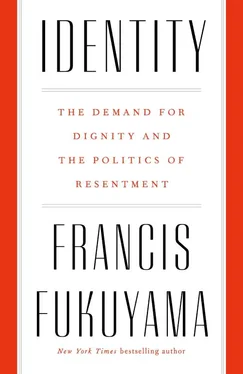However, one particular strand spoke to the anxieties raised by identity politics. Cyberpunk authors such as Bruce Sterling, William Gibson, and Neal Stephenson saw a future dominated not by centralized dictatorships, but by uncontrolled social fragmentation that was facilitated by a new emerging technology called the internet. Stephenson’s 1992 novel Snow Crash posited a ubiquitous virtual “metaverse” in which individuals could adopt avatars, interact, and change their identities at will. The United States had broken down into “burbclaves,” suburban subdivisions catering to narrow identities such as New South Africa for the racists with their Confederate flags, or Mr. Lee’s Greater Hong Kong for Chinese immigrants. Passports and visas were required to travel from one neighborhood to the other. The CIA was privatized, and the USS Enterprise had become a floating home for refugees. The authority of the federal government shrank to encompass only the land on which federal buildings were located. {13}
Our present world is simultaneously moving toward the opposing dystopias of hypercentralization and endless fragmentation. China, for instance, is building a massive dictatorship in which the government collects data on the daily transactions of every one of its citizens and uses big-data techniques and a social credit system to control its population. On the other hand, different parts of the world are seeing the breakdown of centralized institutions, the emergence of failed states, polarization, and a growing lack of consensus over common ends. Social media and the internet have facilitated the emergence of self-contained communities, walled off not by physical barriers but by belief in shared identity.
The nice thing about dystopian fiction is that it almost never comes true. That we can imagine how current trends will play themselves out in an ever more exaggerated fashion serves as a useful warning: 1984 became a potent symbol of a totalitarian future we wanted to avoid and helped inoculate us from it. We can imagine better places to be in, which take account of our societies’ increasing diversity, yet present a vision for how that diversity will still serve common ends and support rather than undermine liberal democracy.
Identity is the theme that underlies many political phenomena today, from new populist nationalist movements, to Islamist fighters, to the controversies taking place on university campuses. We will not escape from thinking about ourselves and our society in identity terms. But we need to remember that the identities dwelling deep inside us are neither fixed nor necessarily given to us by our accidents of birth. Identity can be used to divide, but it can and has also been used to integrate. That in the end will be the remedy for the populist politics of the present.
Abrajano, Marisa, and Zoltan L. Hajnal. White Backlash: Immigration, Race, and American Politics. Princeton, NJ: Princeton University Press, 2016.
Aleinikoff, T. Alexander, and Douglas B. Klusmeyer, eds. From Migrants to Citizens: Membership in a Changing World . Washington, DC: Carnegie Endowment for International Peace, 2000.
Barrett, Richard. Foreign Fighters in Syria . New York: Soufan Group, 2014.
Beauvoir, Simone de. The Second Sex . New York: Alfred A. Knopf, 1953.
Benhabib, Seyla, Ian Shapiro, and Danilo Petranovic, eds. Identities, Affiliations, and Allegiances . Cambridge: Cambridge University Press, 2007.
Berglund, Jenny. Publicly Funded Islamic Education in Europe and the United States . Washington, DC: Brookings Institution, 2015.
Berman, Sheri. “The Lost Left.” Journal of Democracy 27 (4) (2016): 69–76.
Bock-Côté, Mathieu. Le multiculturalisme comme religion politique . Paris: Les Éditions du Cerf, 2016.
Brubaker, Rogers. Citizenship and Nationhood in France and Germany. Cambridge, MA: Harvard University Press, 1992.
Canefe, Nergis. “Citizens v. Permanent Guests: Cultural Memory and Citizenship Laws in a Reunified Germany.” Citizenship Studies 2 (3) (1998): 519–44.
Casper, Gerhard. “The Concept of National Citizenship in the Contemporary World: Identity or Volition?” Hamburg, Germany: Bucerius Law School, 2008.
________. “Forswearing Allegiance.” In Jahrbuch des öffentlichen Rechts der Gegenwart , edited by Peter Häberle. Tübingen, Germany: Mohr Siebeck, 2013.
Coates, Ta-Nehisi. Between the World and Me . New York: Spiegel and Grau, 2015.
Cramer, Katherine J. The Politics of Resentment: Rural Consciousness and the Rise of Scott Walker . Chicago: University of Chicago Press, 2016.
Crenshaw, Kimberlé Williams. “Mapping the Margins: Intersectionality, Identity Politics, and Violence Against Women of Color.” Stanford Law Review 43:1241–99 (July 1991).
DeWaay, Bob. Redefining Christianity: Understanding the Purpose Driven Movement . Springfield, MO: 21st Century Press, 2006.
Ford, Robert, and Matthew Goodwin. Revolt on the Right: Explaining Support for the Radical Right in Britain . London: Routledge, 2014.
Fukuyama, Francis. “The End of History?” National Interest 16 (1989): 3–18.
________. The End of History and the Last Man . New York: Free Press, 1992.
________. The Origins of Political Order: From Prehuman Times to the French Revolution . New York: Farrar, Straus and Giroux, 2011.
________. “The Populist Surge.” American Interest 13 (2018): 16–18.
________. Our Posthuman Future: Consequences of the Biotechnology Revolution . New York: Farrar, Straus and Giroux, 2001.
________. Political Order and Political Decay: From the Industrial Revolution to the Globalization of Democracy . New York: Farrar, Straus and Giroux, 2014.
________. Trust: The Social Virtues and the Creation of Prosperity . New York: Free Press, 1995.
Fuller, Robert W. Dignity for All: How to Create a World Without Rankism . Oakland, CA: Berrett-Koehler Publishers, 2008.
________. Somebodies and Nobodies: Overcoming the Abuse of Rank. Gabriola Island, British Columbia: New Society Publishers, 2003.
Furedi, Frank. “The Therapeutic University.” American Interest 13 (1) (2017): 55–62.
________. Therapy Culture: Cultivating Vulnerability in an Uncertain Age. London: Routledge, 2004.
Galston, William A. Anti-Pluralism: The Populist Threat to Liberal Democracy . New Haven, CT: Yale University Press, 2018.
Gellner, Ernest. Nations and Nationalism . Ithaca, NY: Cornell University Press, 1983.
Glensy, Rex. “The Right to Dignity.” Columbia Human Rights Law Review 43 (65) (2011): 65–142.
Goodman, Sara W. “Fortifying Citizenship: Policy Strategies for Civic Integration in Western Europe.” World Politics 64 (4) (2012): 659–98.
Habermas, Jürgen. “Citizenship and National Identity: Some Reflections on the Future of Europe.” Praxis International 12 (1) (1993): 1–19.
________. The Postnational Constellation: Political Essays . Cambridge, MA: MIT Press, 2001.
Haggard, Stephan. Developmental States . New York: Cambridge University Press, 2018.
Herder, Johann Gottfried von. J. G. Herder on Social and Political Culture . Cambridge: Cambridge University Press, 1969.
________. Reflections on the Philosophy of the History of Mankind. Chicago: University of Chicago Press, 1968.
Hochschild, Arlie Russell. Strangers in Their Own Land: Anger and Mourning on the American Right . New York: New Press, 2016.
Читать дальше












